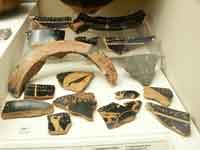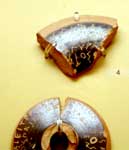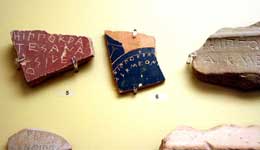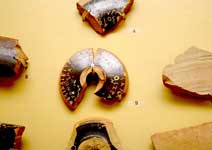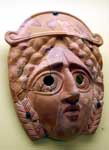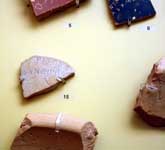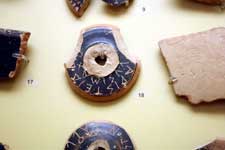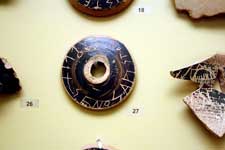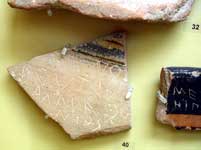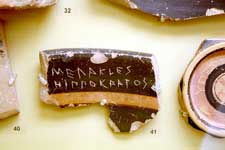- A list, differing slightly from that given above, of known ostracisms and many of the key Greek passages translated, from John Paul Adams's site at CSU Northridge.
.
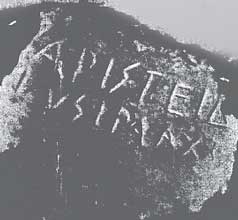
Aristides Ostrakon
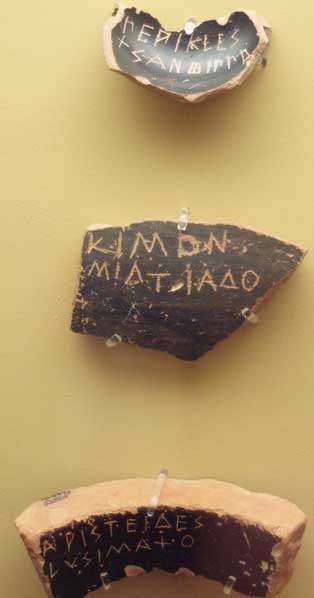
Ostraka (Source) |
Ostracism was a procedure under the Athenian democracy where a prominent citizen could be expelled from the city for ten years. Not considered a penalty, the expulsion could be pre-emptive, to remove someone thought to be a threat to the state (or who just seemed too powerful), or it might be a way of diffusing a major confrontation between rival politicians. But the command that it made was a neutral one: We think it better you not be here for a time.
The procedure is to be distinguished from the modern use of the term, which generally refers to informal modes of exclusion from a group. (See shunning.)
Procedure
The name is derived from the ostraka, (singular ostrakon , ὄστρακον), referring to the potsherds or pieces of broken pottery that were used as the writing surface to nominate people for expulsion. Broken pottery, abundant and virtually free, served as a kind of scrap paper, in contrast to papyrus, which, imported from Egypt as a high-quality writing surface, was too costly for such transitory uses.
Each year the Athenians were asked in the assembly whether or not they wished to hold an ostracism that year. (The question was put in the sixth of the ten months used for state business under the democracy: equivalent to our January or February.) If they voted yes, then two months later the ostracism was held. In a roped-off area of the agora, citizens would bring potsherds on which they had scratched the name of the citizen they wished to expel and deposit them in urns. First the presiding officials counted the number of ostraka submitted. If a minimum of 6000 was reached, then the ostracism proceeded: the officials sorted the names out into separate piles, and the person receiving the highest number of votes was sent into exile for ten years.
The person nominated had ten days to leave the country – if he attempted to return the penalty was death. Notably, the property of the man banished was not confiscated and there was no loss of status. After the ten years he was allowed to return without stigma. It was possible for the assembly to recall an ostracised person ahead of time: before the Persian invasion of 479 BC, an amnesty was declared under which at least two ostracised leaders, Xanthippus, the father of Pericles, and Aristides 'the Just,' are known to have returned. Similarly, Cimon, ostracised 461 BC, was recalled not many years later during an emergency.( Plutarch Life of Cimon 17.2–6)
Ostracism in context
Ostracism is crucially different from a judicial process: there is no charge and no defence can be mounted by the person expelled. The two stages of the procedure run in the reverse order from that used under almost any trial system: here it is as if a jury were first being asked "Do you want to find someone guilty?" and then two months later being asked "So who do you want?" Equally out of place in a judicial framework is the institution's perhaps most peculiar feature – that it can take place at most once a year and for one person only. (In this it resembles the Greek pharmakos or human scapegoat, though there it is a lowly member of the community that is ejected.)
A further opposition between these two modes and one not obvious from a modern perspective, ostracism was an automatic procedure that required initiative from no individual, with the vote simply happening or not depending on the wish of the electorate, a diffuse exercise of power. An Athenian trial, by contrast, was always the initiative of a particular citizen-prosecutor: while prosecution often led to a counterattack (or was already one itself, and so on in an ongoing chain of retaliation), no such response was possible in the case of ostracism because responsibility lay with the polity as a whole. In contrast to a trial, ostracism reduced political tension rather than increased it.
Although ten years of exile must have been a hard thing for any Athenian to face, in comparison with the kind of sentences inflicted by courts, it was relatively mild: when dealing with politicians held to be acting against the interests of the people, Athenian juries could inflict such truly severe penalties as death, unpayably massive fines, confiscation of property, permanent exile and loss of citizen rights (atimia). Further, the elite Athenians who suffered ostracism were rich and/or noble men who had connections (xenoi) in the wider Greek world and who, unlike genuine exiles, were able to access their income in Attica from abroad. In Plutarch, following as he does the anti-democratic line common in elite sources, the fact that people might be recalled early seems like yet another example of the inconstancy of mob-rule. However, that automatic figure of ten years was probably often more than enough to bring off whatever had been sought by the expulsion. As ostracism was simply a pragmatic measure, notions like 'serving out the full sentence' do not apply. To repeat: it was not a penalty.
One curious window on the practice is the cache of 190 ostraka discovered dumped in a well next to the acropolis. From the handwriting they appear to have been written by 14 individuals and bear the name Themistokles, ostracised before 471 BC. Evidently they were meant for distribution to voters. This need not be electoral fraud as they may not amount to anything much worse than modern how-to-vote cards, but their being dumped in the well perhaps suggests the producers were not keen to advertise their efforts. What they do indicate is that groups of people at Athens organised to try and influence the outcome of ostracisms, with what success it is impossible to say. It is, of course, the two-month gap between the first and second phases that allowed them to even try.
That gap is a key feature in the institution, much like in elections under modern democracies. It worked firstly against the candidate for expulsion being chosen out of immediate anger, setting the decision into a longer time frame (though an Athenian general might not want to lose a battle the week before that second vote: Plutarch Life of Cimon 17.2). And secondly it opened up a period for discussion (or agitation), whether informally in daily talk or in public speeches before the assembly or courts. (Oration IV of Andocides purports to be speech urging the ostracism of Alcibiades in 415 BC, but is probably not authentic.) In this process a consensus, or rival consensuses, might emerge. Further, in that time of waiting to see who would have to go, the ordinary citizens must have felt a certain power over the very greatest members of their city, and those most prominent citizens, on their side, an extra incentive to care how their social inferiors regarded them – and those are very democratic feelings.
Period of operation
Ostracism was not in use throughout the whole period of Athenian democracy (c. 506–322 BC), but was a feature of political life only in the fifth century. The standard account, found in Aristotle's Athenian Constitution 22.3, attributes the establishment to Cleisthenes, a pivotal reformer in the creation of the democracy. In that case ostracism would have been in place from around 506 BC. The first victim of the practice, however, was not expelled until twenty years later. This was Hipparchos son of Chormos, a relative of the tyrant Peisistratos. Over the course of the next sixty years some twelve or more individuals followed him: the list may not be complete, but there is good reason to believe the Athenians did not feel the need to eject someone in this way every year. The list of known ostracisms runs as follows:
- 487 Hipparchos son of Charmos
- 486 Megacles son of Hippocrates
- 485 (name unknown)
- 484 Xanthippos son of Ariphron; Pericles' father
- 482 Aristides son of Lysimachus
- 471 Themistocles son of Neocles (last possible year)
- 461 Cimon son of Miltiades
- 460 Alcibiades son of Kleinias; grandfather of Alcibiades
- 457 Menon son of Meneclides [less certain]
- 443 Thucydides son of Milesias
- 440s Callias son of Didymos [less certain]
- 440s Damon son of Damonides [less certain]
- 416 Hyperbolos son of Antiphanes (+/- 1 year)
Something like 12,000 political ostraca have been excavated in the Athenian agora (and in the Ceramicus). They seem to fall into three distinct phases: the 480's, mid-century 461-443 and finally the years 417-415: this matches fairly well with the clustering of known expulsions (Themistocles before 471 may count as an exception), suggesting that the Athenian zeal for ostracism had its peaks and troughs. (Lang 1990:3–6)
The last known ostracism was that of Hyperbolos in c. 417 BC. There is no sign of its use after the Peloponnesian war, when democracy was restored after the oligarchic coup of the Thirty had collapsed in 403 BC. However, while ostracism was not an active feature of the 4th-century version of democracy, it remained a presence. Each year the question was still put to the assembly: did they wish to hold one. But it was no longer a matter for real consideration.
Purpose
A practice like ostracism, carried out by thousands of people over many decades of an evolving political situation and culture, cannot express a single monumental purpose. Still, observations can be made about outcomes, as well as about the kinds of scenarios its designers and users may have envisioned it being deployed against.
The first rash of people ostracised in the decade after the defeat of the first Persian invasion at Marathon in 492 BC were all related or connected to the tyrant Peisistratos, who had controlled Athens for 36 years up to 527 BC. After his son Hippias was deposed with Spartan help in 510 BC, the family sought refuge with the Persians, and nearly twenty years later Hippias landed with their invasion force at Marathon. Tyranny and Persian aggression were paired threats facing the new democratic regime at Athens, and ostracism was used against both.
Tyranny and democracy had both arisen at Athens out of clashes between regional and factional groups organised around Big Men, among whom was Cleisthenes himself. But in many of its features the democracy strove to reduce the role of these factional and regional alliances as the focus of citizen loyalties. Ostracism, too, may have been intended to work in the same direction: by temporarily decapitating a faction, it could help de-escalate a confrontation that might have gone on to threaten the order of the state.
In later decades when the threat of tyranny was remote, ostracism seems to have been used as a way to decide between radically opposed policies. For instance, in 443 BC Thucydides son of Milesias (not the historian) was ostracised. He led an aristocratic opposition to Athenian imperialism and in particular to Perikles' building program on the acropolis, which was funded with money taken from Athenian allies/subjects notionally to carry on the fight against Persia. By expelling Thucydides the Athenian people sent a clear message about the direction of Athenian policy. (Plutarch Life of Pericles 11–12, 14) Similar but more controversial claims have been made about the ostracism of Cimon in 461 BC.
The motives of individual citizens actually submitting names to the pool cannot, of course, be known. Many of the surviving ostraka name people otherwise unattested – they may well be just someone the submitter happened not to like. In such a case there was no likelihood of the targeted person ending up having to pack his bags for ten years, but the small moment of private spite may be seen as a secular, civic variant of Athenian curse tablets (studied in scholarly literature under the Latin name defixiones), where small dolls were wrapped in lead sheets written with curses and then buried, sometimes stuck through with nails for good measure.
In one famous anecdote about Aristides, known as "the Just", who was ostracised in 482, an illiterate citizen, not recognising him, came up to ask him to write the name Aristides on his ostrakon. When Aristides asked why, the man replied it was because he was sick of hearing him being called "the Just". (Plutarch Life of Aristides 7.7) Perhaps just the sense that someone had gotten too big for his boots to be good for a democratic society was enough to get his name onto ostraka.
Falls into disuse
The last ostracism, that of Hyperbolos in or near 415 BC, is elaborately narrated by Plutarch (in three separate lives): Hyperbolos is pictured urging the people to expel one of his rivals, but they, Nicias and Alcibiades, laying aside their own hostility for a moment, use their combined influence to have him ostracised instead. But then, says Plutarch, the people, disgusted, abandon the procedure forever. Whatever the value of this story, it cannot provide a sufficient explanation for ostracism's obsolescence.
In part ostracism lapsed as a procedure at the end of the fifth century because it was replaced by the graphe paranomon, a regular court action under which a much larger number of politicians might be targeted, instead of just one a year as with ostracism, and with greater severity. But it may already have come to seem like an anachronism as factional alliances organised around Big Men became increasingly less significant in the later period, and power was more specifically located in the interaction of the individual speaker with the power of the assembly and the courts. The threat to the democratic system in the late 5th century came not from tyranny but from oligarchic coups (two brief seizures of power, in 411 by "the Four Hundred" and in 404 BC by "the Thirty"), which were not dependent on single powerful individuals: ostracism was not an effective defence against the oligarchic threat and it was not so used.
Other cities are known to have set up forms of ostracism on the Athenian model, namely Megara, Miletos, Argos and Syracuse. In the last of these it was referred to as petalismos, because the names were written on olive leaves. Little is known about these institutions.
References
Some of the longer ancient passages:
From Aristotle Constitution of the Athenians:
From Plutarch's 'Lives':
Note that the ancient sources on ostracism are mostly 4th century or much later and often limited to brief descriptions such as notes by lexicographers. Most of the narrative and analytical passages of any length come from Plutarch writing five centuries later and with little sympathy for democratic practices. There are no contemporary accounts that can take one into the experiences of participants: a dense account of Athenian democracy can only be made on the basis of the much fuller sources available in the 4th century (especially the Attic orators) after ostracism had fallen into disuse. We are largely dealing with a 4th-century memory of the institution.
- Oxford Classical Dictionary, 2nd edition(Oxford 1996): ostracism
- Ostraka, Mabel Lang (Athens 1990)
- Ostracism at Athens, Eugene Vanderpool (Cincinnati 1970)
- The Origins of Ostracism, A Synthesis, Rudi Thomsen (Copenhagen 1972)
- 'The Ostracism of Hyberbolus', J.P. Rhodes, in Ritual, Finance, Politics: Athenian Democratic Accounts presented to David Lewis, edd. R. Osborne, S. Hornblower (Oxford 1994), p. 85-99
- The Athenian Democracy in the age of Demosthenes, Mogens Herman Hansen (Oxford 1987)
- Mass and Elite in Democratic Athens: Rhetoric , Ideology and the Power of the People, Josiah Ober (Princeton 1989)
| Ancient Greece
Science, Technology , Medicine , Warfare, , Biographies , Life , Cities/Places/Maps , Arts , Literature , Philosophy ,Olympics, Mythology , History , Images Medieval Greece / Byzantine Empire Science, Technology, Arts, , Warfare , Literature, Biographies, Icons, History Modern Greece Cities, Islands, Regions, Fauna/Flora ,Biographies , History , Warfare, Science/Technology, Literature, Music , Arts , Film/Actors , Sport , Fashion --- |
Retrieved from "http://en.wikipedia.org/"
All text is available under the terms of the GNU Free Documentation License

